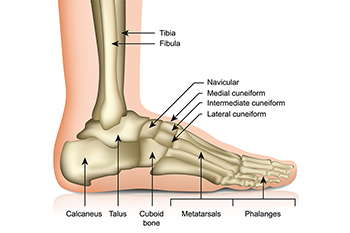
The foot is a marvel of anatomical design, essential for effective heel-to-toe walking. The heel's support comes from the calcaneus bone, which absorbs impact during the initial heel strike. The Achilles tendon, connecting the calf muscles to the heel, plays a vital role in lifting the heel and propelling the body forward. The fibula and tibia, the major bones of the lower leg, provide structural stability and support to the ankle joint. The talus, situated between the tibia and calcaneus, facilitates smooth movement of the foot. As the foot rolls forward, the metatarsals and phalanges work together to push off the ground. This intricate coordination of bones, tendons, muscles, and ligaments ensures efficient movement and balance throughout each step. A podiatrist is medically qualified to treat foot and ankle conditions. If you have injured your foot or have chronic foot pain, it is suggested that you contact a podiatrist who can offer safe and effective treatment solutions.
If you have any concerns about your feet, contact one of our podiatrists from Kokomo Foot & Ankle Center. Our doctors can provide the care you need to keep you pain-free and on your feet.
Biomechanics in Podiatry
Podiatric biomechanics is a particular sector of specialty podiatry with licensed practitioners who are trained to diagnose and treat conditions affecting the foot, ankle and lower leg. Biomechanics deals with the forces that act against the body, causing an interference with the biological structures. It focuses on the movement of the ankle, the foot and the forces that interact with them.
A History of Biomechanics
- Biomechanics dates back to the BC era in Egypt where evidence of professional foot care has been recorded.
- In 1974, biomechanics gained a higher profile from the studies of Merton Root, who claimed that by changing or controlling the forces between the ankle and the foot, corrections or conditions could be implemented to gain strength and coordination in the area.
Modern technological improvements are based on past theories and therapeutic processes that provide a better understanding of podiatric concepts for biomechanics. Computers can provide accurate information about the forces and patterns of the feet and lower legs.
Understanding biomechanics of the feet can help improve and eliminate pain, stopping further stress to the foot.
If you have any questions please feel free to contact our office located in Contact Us . We offer the newest diagnostic and treatment technologies for all your foot and ankle needs.
